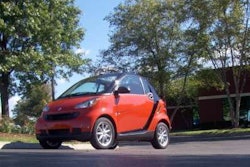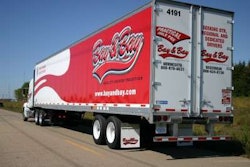UPS announced Thursday, Feb. 19, that it had deployed 300 new delivery trucks powered by compressed natural gas (CNG) to seven cities in Colorado, Georgia, Oklahoma and California. UPS says the CNG vehicles, part of an order placed last May, will allow it to further reduce its dependence on traditional fossil fuels like gasoline and diesel and lower its carbon footprint.
UPS says it already operates the largest private fleet of alternative fuel vehicles in its industry — 1,819 in total with these additions. The new CNG trucks have been deployed over the past month to Denver (43), Atlanta (46), Oklahoma City (100) and four cities in California: Sacramento (21), San Ramon (63), Los Angeles (9) and Ontario (18). All now are in service.
“Deploying alternative fuel vehicles dates back to the early days of UPS, and this CNG deployment is one more step toward the greening of our fleet,” says Robert Hall, director of vehicle engineering for Atlanta-based UPS. “Continuing to add CNG delivery trucks to our fleet is a sustainable choice because natural gas is a cost-effective, clean-burning and readily available fuel.”
UPS says the 300 trucks deployed over the past month were built from scratch as CNG vehicles and join more than 800 CNG vehicles already in use by UPS worldwide. The CNG truck bodies are identical externally to the signature-brown trucks that comprise the UPS fleet. Marked with decals as CNG vehicles, the trucks are expected to yield a 20 percent emissions reduction over the cleanest diesel engines available in the market today.
The company also recently announced the purchase of seven hydraulic-hybrid delivery vehicles, a first in the industry, and has conducted research with hydrogen fuel cell vehicles. “Deploying eco-friendly delivery vehicles is one of the many ways UPS demonstrates its commitment to sustainable business practices,” Hall says. “The company plans to continue to expand its green fleet and to focus deployments in areas with air quality challenges.”










